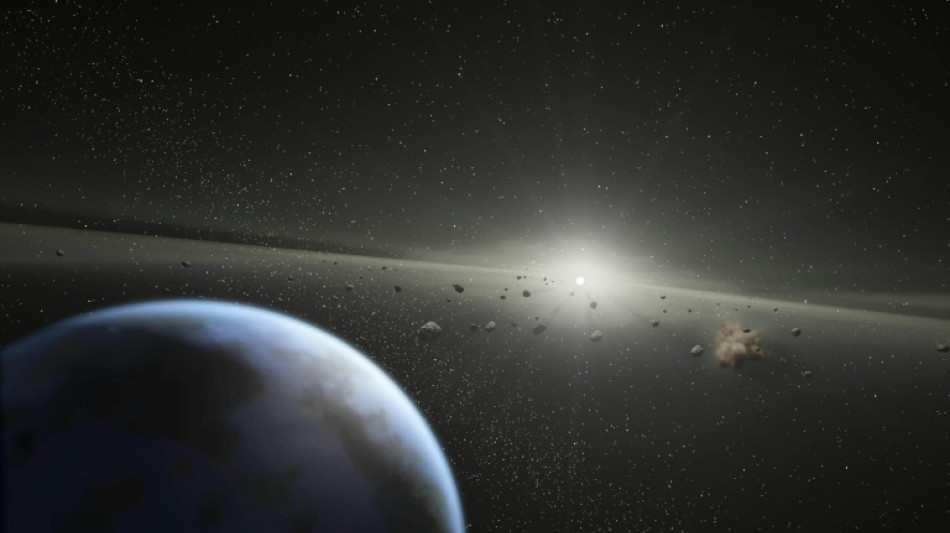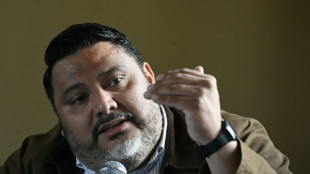
-
 Morocco part company with coach Regragui as World Cup looms
Morocco part company with coach Regragui as World Cup looms
-
Lens beat Lyon on penalties to reach French Cup semis

-
 El Salvador's Bukele holding dozens of political prisoners: rights group
El Salvador's Bukele holding dozens of political prisoners: rights group
-
With Iran war, US goes it alone like never before

-
 Spurs slip deeper into relegation trouble after loss to Palace
Spurs slip deeper into relegation trouble after loss to Palace
-
European, US stocks back in sell-off mode as oil prices surge

-
 Pete Hegseth: Trump's Iran war attack dog
Pete Hegseth: Trump's Iran war attack dog
-
Celtics' Tatum could make injury return on Friday

-
 'Enemy at home': Iranian authorities tighten grip as war rages
'Enemy at home': Iranian authorities tighten grip as war rages
-
Bethell set for 'hell of a career', says England captain Brook

-
 France coach Galthie slams Scotland for 'smallest changing room in the world'
France coach Galthie slams Scotland for 'smallest changing room in the world'
-
Medvedev arrives in Indian Wells after being stranded in Dubai

-
 Trump fires homeland security chief Kristi Noem
Trump fires homeland security chief Kristi Noem
-
Mideast war risks pulling more in as conflict boils over

-
 Wales' James Botham 'sledged' by grandfather Ian Botham after Six Nations error
Wales' James Botham 'sledged' by grandfather Ian Botham after Six Nations error
-
India hero Samson eyes 'one more' big knock in T20 World Cup final

-
 Britney Spears detained on suspicion of driving while intoxicated
Britney Spears detained on suspicion of driving while intoxicated
-
Grooming makes Crufts debut as UK dog show widens offer

-
 Townsend insists Scots' focus solely on France not Six Nations title race
Townsend insists Scots' focus solely on France not Six Nations title race
-
UK sends more fighter jets to Gulf: PM

-
 EU to ban plant-based 'bacon' but veggie 'burgers' survive chop
EU to ban plant-based 'bacon' but veggie 'burgers' survive chop
-
Leagues Cup to hold matches in Mexico for first time

-
 India reach T20 World Cup final after England fail in epic chase
India reach T20 World Cup final after England fail in epic chase
-
Conservative Anglicans press opposition to Church's first woman leader

-
 Iran players sing anthem and salute at Women's Asian Cup
Iran players sing anthem and salute at Women's Asian Cup
-
India beat England in high-scoring T20 World Cup semi-final

-
 Mideast war traps 20,000 seafarers, 15,000 cruise passengers in Gulf
Mideast war traps 20,000 seafarers, 15,000 cruise passengers in Gulf
-
Italy bring back Brex to face England

-
 French policeman to be tried over 2023 killing of teen
French policeman to be tried over 2023 killing of teen
-
Oil prices rise, stocks slide as Middle East war stirs supply concerns

-
 More flights take off despite continued fighting in Middle East
More flights take off despite continued fighting in Middle East
-
Ukraine, Russia free 200 POWs each

-
 Middle East war halts work at WHO's Dubai emergency hub
Middle East war halts work at WHO's Dubai emergency hub
-
Paramount's Ellison vows CNN editorial independence

-
 US says attacks on alleged drug boats have spooked traffickers
US says attacks on alleged drug boats have spooked traffickers
-
Dempsey returns as Scotland shuffle pack for Six Nations clash against France

-
 India pile up 253-7 against England in T20 World Cup semi-final
India pile up 253-7 against England in T20 World Cup semi-final
-
Wary Europeans pledge 'defensive' military aid in Mideast war

-
 Seven countries to boycott Paralympics ceremony over Russia: organisers
Seven countries to boycott Paralympics ceremony over Russia: organisers
-
UK's Crufts dog show opens with growing global appeal

-
 PSG prepare for Chelsea clash with Monaco rematch
PSG prepare for Chelsea clash with Monaco rematch
-
Google opens AI centre as Berlin defends US tech reliance

-
 Second Iranian ship nears Sri Lanka after submarine attack
Second Iranian ship nears Sri Lanka after submarine attack
-
Portugal mourns acclaimed writer Antonio Lobo Antunes

-
 Union loses fight against Tesla at German factory
Union loses fight against Tesla at German factory
-
Wales revel in being the underdogs, says skipper Lake

-
 German school students rally against army recruitment drive
German school students rally against army recruitment drive
-
Wary European states pledge military aid for Cyprus, Gulf

-
 Liverpool injuries frustrating Slot in tough season
Liverpool injuries frustrating Slot in tough season
-
Real Madrid will 'keep fighting' in title race, vows Arbeloa


Where are all the aliens?: Fermi's Paradox explained
Astronomers raised hopes that humanity might not be alone in the universe by announcing on Thursday they have detected the most promising hints yet of life on a distant planet.
But given the age and vastness of the universe, a different question has long puzzled some scientists: why haven't we already come in contact with aliens?
"Where is everybody?" Enrico Fermi asked fellow famous physicists including Edward Teller over lunch in 1950.
This quandary was named Fermi's Paradox.
"It's a numbers game," Jason Wright, the director of the extraterrestrial intelligence centre at Pennsylvania State University, told AFP.
The Milky Way is around 10 billion years old and is home to more than 100 billion stars.
This suggests there is likely a mind-boggling number of potentially habitable planets in our home galaxy alone.
That could include K2-18b, where astronomers said Thursday they have detected signs of a chemical that is only produced by microbial life on Earth.
Wright said Fermi's Paradox essentially suggests that -- given enough time -- "every alien species will eventually have their own Elon Musk who will go out and settle the next star over".
That we have not yet heard from aliens is known as "the mystery of the great silence".
- So what are the theories? -
At least 75 speculative solutions to Fermi's Paradox have been proposed so far, according to a 2015 book, though Wright guessed more have been added since.
First, it is possible that humanity has not yet detected alien life because there isn't any -- we are truly alone.
Many scientists feel this is unlikely.
Some 87 percent of over 1,000 scientists in relevant fields surveyed in Nature Astronomy earlier this year agreed there is at least a basic form of extraterrestrial life.
More than 67 percent agreed that intelligent aliens are out there.
Of course, it is also possible that aliens are already here and we have not noticed -- or that it has been covered up.
Or interstellar space could just be too difficult to traverse, the distances too vast, the resources needed too great.
- What if there is a 'great filter'? -
Another theory is that there is some kind of "great filter" that prevents life -- or intelligent life -- from occurring in the first place.
Or perhaps there is some kind of barrier that stops civilisations from advancing beyond a certain point.
For example, once civilisations develop the technology to travel through space, they might tend to destroy themselves with something like nuclear weapons.
Or maybe they burn through their planet's natural resources, or make their climate unliveable.
Some of these theories seem to be influenced by fears for human civilisation -- the one example we have of intelligent life.
But Wright felt this was unlikely because any such barrier would have to be the same across the whole universe.
It would also have to make the species go totally extinct every time, otherwise they would eventually bounce back and try again at space travel.
- Are we in a zoo or planetarium? -
There are even more galaxy-brained ideas.
Under the "zoo" hypothesis, technologically advanced aliens would be leaving humans alone to observe us from afar, like animals in a zoo.
The "planetarium" hypothesis posits that aliens could be creating an illusion that makes space seem empty to us, keeping us in the dark.
- ...or a 'dark forest'? -
This theory got its name from the second book in Chinese author Cixin Liu's science-fiction series "The Three-Body Problem".
It posits that the universe is a "dark forest" in which no one wants to reveal their presence lest they be destroyed by others.
There are other hypotheses that aliens prefer to "transcend" to another plane of existence -- which some have compared to virtual reality -- so don't bother with interstellar travel.
- Why would they all be the same? -
But there is a big problem with many of these "so-called solutions," Wright said.
They tend to assume that all the hypothetical kinds of aliens across the universe would all behave in the same way -- forever.
This has been dubbed the "monocultural fallacy".
Wright, who has used SETI telescopes to search for radio signals or lasers from the stars, also pushed back against the idea that humanity would necessarily have already picked up on any alien signal.
Aliens could be sending out messages using all sorts of unknown technology, so maybe the galaxy is not as silent as we think, he said.
"Those of us looking for life in the universe generally don't think of the Fermi paradox or the great silence as such a big problem."
K.Sutter--VB



